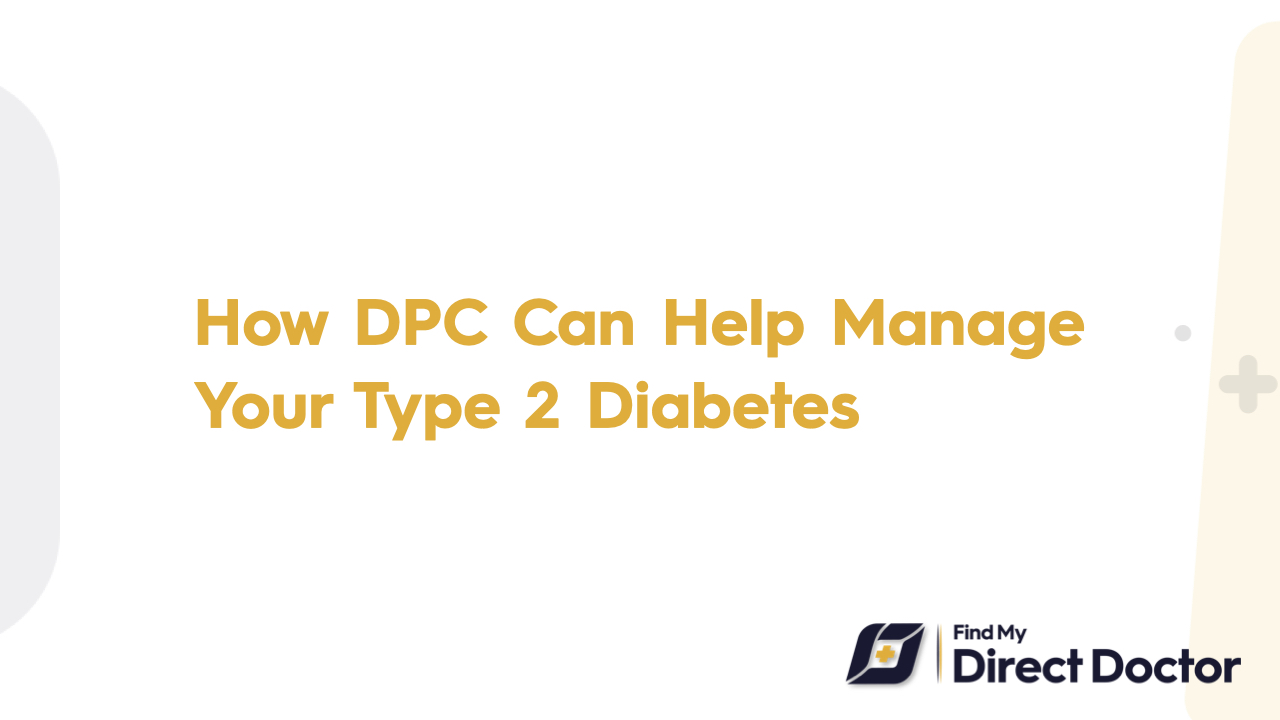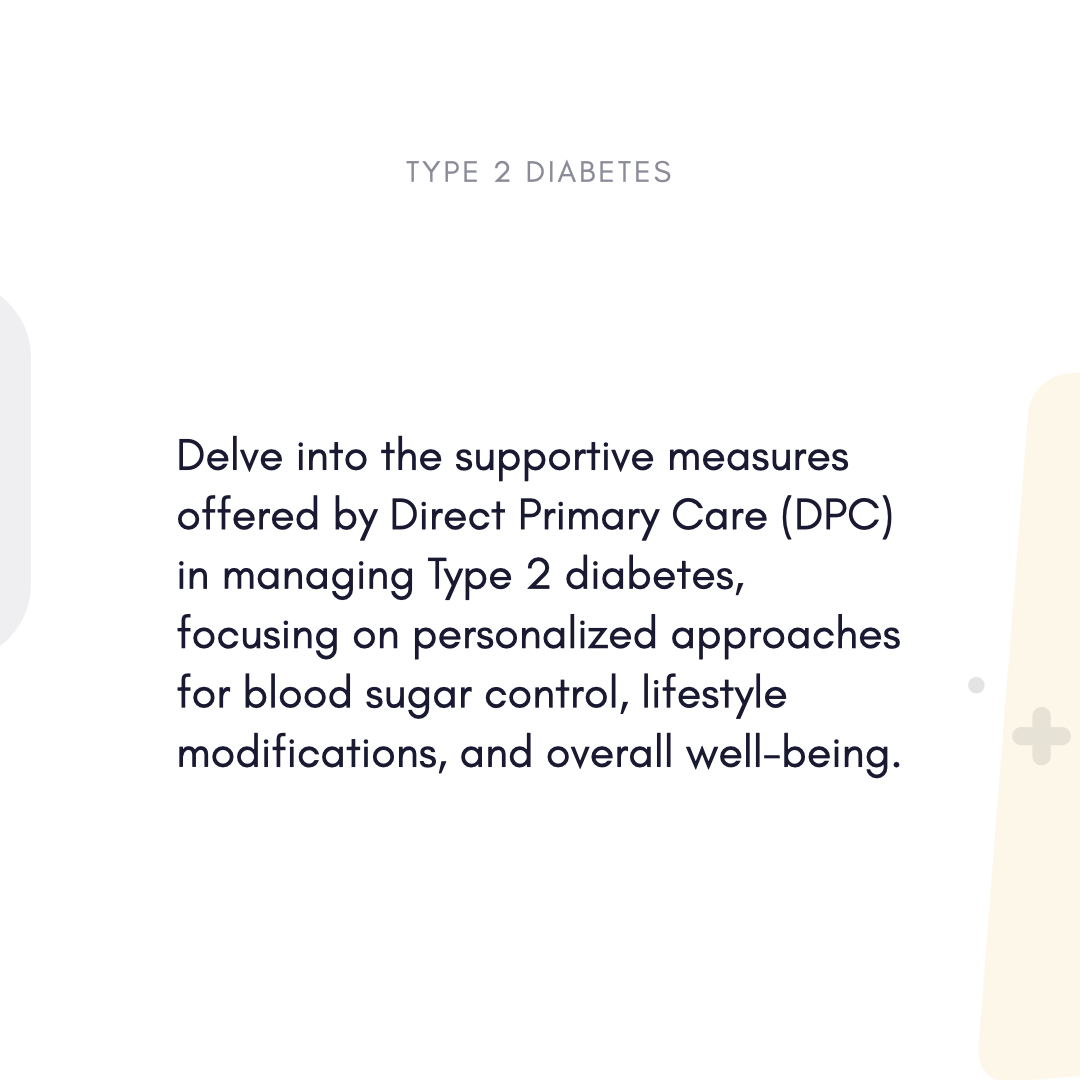Type 2 Diabetes and Direct Primary Care (DPC): A Personalized Path to Reversal
You understand the unrelenting difficulty of Type 2 Diabetes (T2D) if you have battled rising HbA1c, weight gain, or insulin injection anxiety. Reversible with the correct treatment, this metabolic condition affects 37 million Americans. Direct Primary Care (DPC), which combines modern treatments, cost transparency, and strategies to reclaim your health, presents a transforming approach to T2D management, though.

Know Type 2 Diabetes and Its Reversibility
From insulin resistance and beta-cell malfunction, T2D results in:
- Damage eyes, kidneys, and nerves in chronic hyperglycemia.
- Comorbidities are NAFLD, heart disease, sleep apnea.
Reversibility variables:
- 5–15% body weight: weight loss.
- Dietary changes (low-carb, Mediterranean).
- Medications including GLP-1 agonists and SGLT2 inhibitors.
DPC Turns Around Under a Membership Model Called T2D Care Direct Primary Care (DPC), Patients Pay a Monthly Fee Usually Between 50 USD and 150 USD for Unlimited Access to Their Primary Care Physician.
For T2D patients, this means no surprise bills, no waiting months for specialist consults, and treatment aimed at remission.
Here's why DPC distinguishes itself:
1. Timely ADA-aligned Interventions
DPC doctors adhere to American Diabetes Association recommendations including:
- Every three months, HbA1c examines: monitoring advancement toward reversal.
- Finding glycemic patterns helps to integrate CGM.
- Urine albumin tests and yearly foot/eye exams help to screen complications.
2. Reasonably priced, cutting-edge therapies
- By providing generic metformin at 4 USD/month instead of 50 USD+ retail, DPC clinics help to lower costs.
- Offering GLP-1 agonists (such semaglutide) wholesale rates.
- Working on cash rates for DEXA scans to track visceral fat loss.
3. Ongoing Lifestyle Coachwork
- Having 24/7 access to your DPC doctor allows you to: change your diet (keto, intermittent fasting).
- Troubleshoot side effects from medications (such GI problems with Ozempic).
- Get mental health advice on emotional eating.
DPC Benefits for T2D Patients
Customized Reversal Strategies
- During each visit, DPC doctors dedicate 30 to 60 minutes developing plans including:
- Sequential medicine: Adding GLP-1s as needed starts with metformin.
- Protocols for exercise: HIIT for insulin sensitivity.
- Guided transition with electrolyte support to induce nutritional ketosis.
Savings in Cost
- There are no co-pays for regular glucose tests.
- With insurance, CGM sensors at 40 USD/month compare to 300 USD+.
- Prevention of expensive complications by early intervention.
Whole Health Integration
DPC addresses:
- Home sleep studies and coordination of CPAP help with sleep apnea.
- Stress management: Mindfulness for cortisol lowering.
- Gut health: Probiotics meant to raise insulin sensitivity.
Personal Success Stories from Real Life
- Case 1: Under DPC's semaglutide + keto plan, John, 52, reversed his T2D (HbA1c 9.1%) in 10 months.
- Case 2: Maria, 45, saved 5,000 USD year by avoiding insulin with DPC's CGM-guided lifestyle changes.
Ask questions about T2D and DPC.
- Q: Is it possible to really reverse T2D?
- A: Absolutely! Metabolic healing and weight loss can help to bring normal glucose levels back. DPC offers the implements.
- Q: Is DPC within reach without insurance?
- A: Sure. On labs and medications, members save 50–70% compared to conventional treatment.
- Q: Suppose I need an endocrinologist?
- A: DPC works with experts at negotiated cash rates for difficult cases.
Why DPC Is a Win for T2D Patients: Why
The ADA stresses customized treatment to reach remission. DPC implements this by:
- Early prediabetes detection is crucial halting development.
- Client empowerment: Carb counting and fasting education
- Cost-simulating simplicity: One pay every month covers unlimited consultations and coordination.
Get Back Your Health with DPC.
Type 2 diabetes need not be a life sentence. Every meal, every exercise, every triumph over insulin resistance—every reversal—you get a partner who innovates, educates, and priorities your reversal with DPC.






